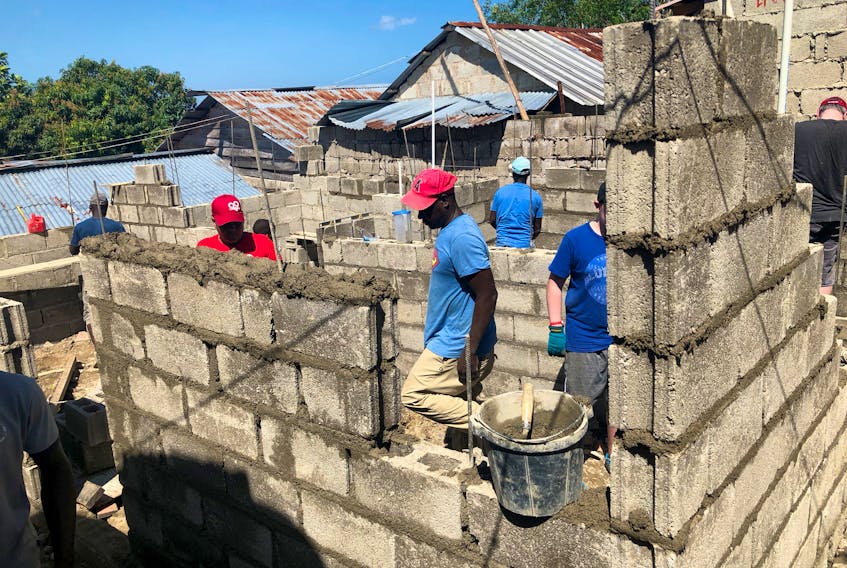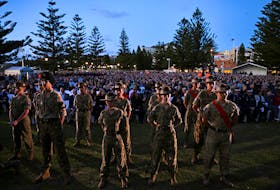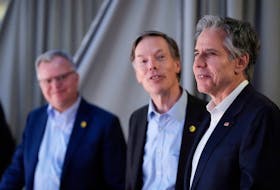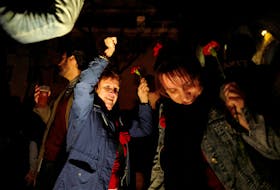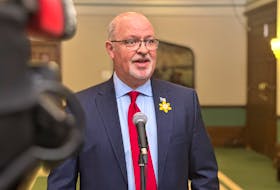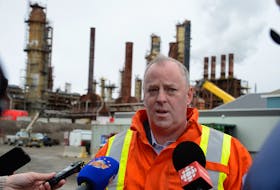A couple of Saturdays ago, I was stepping out of a tiny new house in La Union, a small community across the main road from Puerto Plata in the Dominican Republic.
There was nothing but bare ground outside, and it had rained the day before. Someone had put a piece of cardboard in front of the door in the hope visitors would take their shoes off. I obliged.
Only two days before, I had been in hospital in the nearby town of Sosua, dealing with a nasty bout of pneumonia. My three-night stay had kept me from the work I’d come to do, but I was determined to make it to the community on the final day, when speeches were made and house keys handed over.
A little breathless, I leaned over to put my hiking shoes back on. Without warning, an older woman bent over and quickly tied my shoelaces. I slipped the other shoe on and she did the same. Feeling surprised and a little awkward, I thanked her and gave her a little hug.
The woman went by the name Mercedes. And as a community leader, she played a key role in helping the Canadian charity Live Different choose two local families to be rescued from their rundown shacks and given a new lease on life.
•••
For five straight days, volunteers with the privately sponsored Val Pippy Family Build got up, grabbed breakfast, lathered themselves up with bug spray and suntan lotion and hopped aboard an open-air bus outside a boutique resort in Sosua. The ride to La Union is about 15 minutes.
Along the mostly two-lane road, motorcycles and scooters weave through traffic like daredevils. A few have whole families precariously perched on them. One passed by with a mother on the back nursing her baby. The local emergency rooms are perpetually clogged with accident victims — mostly motorcycle passengers who may have to wait days to have a broken limb set.
Each day, the bus turned off the main road at a grove of trees and meandered along a dirt road. It passed by a modern school and chugged alongside a littered open field where a few farm animals grazed on green grass. At the end of the road, the volunteers split into two groups, each grabbing his or her knapsack and walking to their assigned building sites. There are no roads through this poorer part of the community, just dirt paths winding between tiny houses on a hillside. From the top of the hill, you can see the path to a dump, where some residents work all day collecting recyclables. Their daily wage: one American dollar.
•••
Merica is 17 and in Grade 8.
“I like drawing, and I like to bake,” she says through a translator, when asked what she wants to do in life. “I’d like to be a baker.”
(Live Different didn’t want me to use last names for privacy reasons.)
Merica has two children, a toddler named Javier and a baby, Jasmine. She, her mother Yeseli and younger siblings lived together under one roof, along with her grandfather and uncle. Yeseli’s husband, Willy, had to cross the border to his native Haiti to get a hernia operation. His relatives there helped pay for it. (Haitians are generally treated as second-class citizens in the Dominican.)
The family of eight was living in a run-down house that leaked like a sieve. One of the two bedrooms was completely uninhabitable. Like many families, they’d have to drape mattresses outside to dry after a heavy rainfall. For many in this town, it’s a struggle to even get food every day to feed everyone. But people look out for each other. The poor help their poorer neighbours.
Julio, who lives nearby, was an active, productive man in his day. He’s the community’s jack-of-all-trades as well as a volunteer firefighter and colourful storyteller. At 79, he has also been plagued in recent years with a hernia. A few days before the Live Different volunteers arrived, he finally got surgery and was staying in a temporary shelter. His old shack didn’t take long to tear down, he says.
“It was a really weak house. It only took four people to destroy it.”
•••
•••
Live Different was founded in 2005 and grew out of an awareness project called Absolute Leadership Development. The latter group had been organizing motivational presentations in schools across Canada. Live Different took that theme further, encouraging students and other charity organizations to raise funds to travel south in person and help build houses, schools and community centres in the Dominican Republic. Over time, their reach extended to Haiti, Mexico and even Thailand.
It’s one of many groups that came on stream during an explosion of so-called “voluntourism.” The movement has met with criticism, especially after some groups were tainted by corruption and less-than-altruistic agendas. It was also easy to portray them as preying on First World guilt — virtuous Westerners playing the hero in humble villages, often just getting in the way.
But Live Different has risen above the fray. It doesn’t try to solve every problem. Its build program focuses primarily on houses, and its organizers work closely with community leaders to make sure the most important needs are met.
“Most people wonder how we do it with the budget we have,” executive director Charles Roberts says.
Their total budget for 2016 was $2.5 million, rising to $3 million in the most recent year. Of that, about $1 million goes toward salaries for about two dozen Live Different staff and more than 200 other part-time workers.
The latter include drivers, translators and contractors. All this covers an average of two builds a month all year long in the Dominican, as well as work in the other countries and in Canada.
On the latter front, the group has recently made forays into this country’s Indigenous communities in an attempt to foster a mutual learning experience.
The success of Live Different is perhaps best illustrated by those who keep returning to help, and by those who have risen through its ranks.
Bill Rawlins of Nanaimo, B.C., has attended more than 50 builds since he first brought a school group to the Dominican in 2005. He now serves on the board of directors.
Alison Willis came to Live Different via her oldest son, Parker. On a bus ride during a family vacation in Panama seven years ago, Parker witnessed two boys fighting over an apple core they had fished out of the garbage.
“That never left my mind,” he says.
He Googled humanitarian organizations and came across Live Different. His parents came on board and Alison is now director of international projects.
“No matter how much my professors teach me, no matter how many documentaries I watch, no matter how many readings I do, I can never get the experience of shovelling water out of my home every morning when it rains … and choosing which child to educate out of the bunch,” said Parker, who now studies international development at York University.
“You can’t change the world,” he muses. “You can change the world for somebody.”
While his brother Robby had been on builds before, his youngest sister Andia was on her first trip to the Dominican. After hearing so much about it from the rest of the family, she says she still found it more rewarding and eye-opening than she could have imagined.
Rawlins, who retired as a school administrator in 2006, says he could never look back, particularly after one experience in a Haitian village. There was no sanitation. One woman was frying fish heads over a small fire. The stench was unbearable.
“I taught this stuff in high school. I never — even in my wildest imagination — thought that conditions could be that bad. I saw it and smelled it and breathed it for the first time.”
•••
During the build, volunteers spend seven hours a day making mezcla (cement mixture) by hand, lugging concrete blocks and twisting rebar together. If someone doesn’t have enough sense to take a water break under the searing sun, staff will gently remind them.
Children mingle and play until they get in the way and an authority figure sends them packing. The contractor is in charge; the local workers usually start the houses, and will finish them if time runs out. Others in the community often lend a hand.
After a day off, everyone returns to dedicate the houses and hand over the keys. Speeches are made, tears flow and another family is given a renewed sense of security and hope.
Julio’s daughter and her baby can move back in with him now that the build is complete. The old wooden structure wasn’t fit for a pregnant woman to live in — anything wooden is eventually decimated by termites.
“After God, this is the biggest thing I can have in my life,” an emotional Julio said as he sat on the bed in his new abode.
“This is the best thing in the world for me.”
Most evenings, Live Different organizers hold meetings with volunteers to get them talking about their experience. It’s a little like counselling, which is not surprising given how new participants find themselves well out of their comfort zone.
Volunteers are given tips on dealing with feelings of guilt and anger. They are encouraged to channel those feelings into constructive actions: raising funds, spreading the word and, last but not least, helping charities back home. The main thing is to keep the ball rolling.
Jamie Lobban, who runs operations in the Dominican along with Jasmine DeBruyne, compares the charity spirit to ripples on the water.
“Think about those ripple effects,” he says, “because they’re endless, I promise you.”
Peter Jackson lives in St. John’s. He is Val Pippy’s cousin.
Who is Val Pippy?
On the outskirts of Puerto Plata is a community called Nuevo Renacer (“New Rebirth”). If you look it up on a map of the Dominican Republic, you won’t find it. Its old name was Aguas Negras, or Black Waters, and the name was not an accident. Situated at the mouth of the Rio San Marcos, the riverbanks and beach around the community are strewn with garbage that floats down the murky river from the adjacent resort city.
It was actually worse. Before a recent cleanup, trucks had been using the beach as a dumpsite.
It was here that Valerie Pippy was thrust into the world of Live Different, a Canadian charity that gives a leg up to Third World communities, usually by building homes. A financial consultant with TE Wealth in Toronto and St. John’s, Pippy had already sponsored the sons of one of her colleagues to go on builds. Two years ago, she took the plunge herself and became a volunteer builder.
“When we finished our build in 2016, I knew that I had to go back and build more houses and make a difference to more lives,” she says.
“My husband and I have always tried to give back to the community we live in as much as we can, but this experience really did make me realize how lucky we are, and we needed to do more,” she adds. “People may say that we should start at home, but our community is a global community and so we should help at home and abroad.”
By the end of 2017, Pippy and her clients had raised enough funds to cover three more builds, two this year and one next. She brought her husband Robert and son David along, as well as her cousin, his wife and a nephew. Other TE colleagues brought family as well, making it a true family build.
Some of the funds came from an inheritance from her British mother, Eileen Jackson. Eileen was the widow of Rupert Jackson, son of Welsh-born Methodist Oliver Jackson. Rev. Jackson became superintendent of missions for the United Church in Newfoundland in the 1930s. He drowned in 1937 during a visit to the south coast. Rupert, after serving in the Second World War, wrote a regular column in The Telegram during the Confederation debates. He died in 1974.
Both homes built this month in the community of La Union bear the initials ELJ as a tribute to Pippy’s mom.
“My mother supported me with my first build in 2016,” she says. “She paid for new towels and sheets for the family. I shared pictures of our 2016 build with her shortly before her death in June 2016. I told her that I would be going back. She asked what she could do to support me. All new builds that I am involved with in the future will have towels and sheets for each family.”
Pippy was inspired by the local community leaders she met.
“Sandra (Tineo) in Neuvo Renacer, where we built in 2016, continues to be an amazing leader for her community,” she says. “It was great to renew our acquaintance this year.
She said she sees a parallel with her own ancestry.
“They all remind me of my grandfather,” she said. “Granddad was a leader of change for Newfoundland and Labrador during the early 1920s and ’30s.”
Pippy will return to the Dominican Republic next year, hopefully with more family members in tow.

